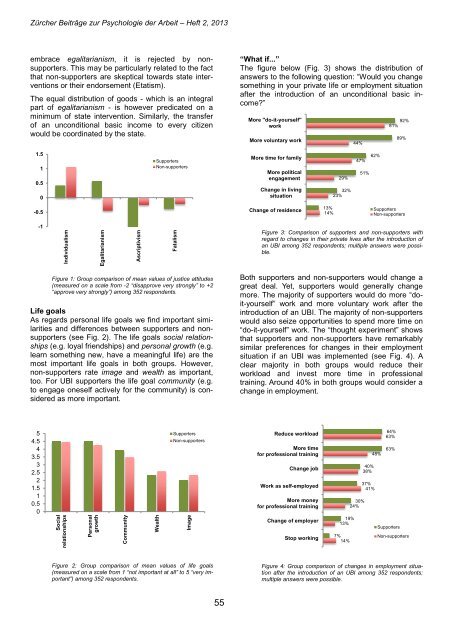Zürcher Beiträge zur Psychologie der Arbeit - PdA - ETH Zürich
Zürcher Beiträge zur Psychologie der Arbeit - PdA - ETH Zürich
Zürcher Beiträge zur Psychologie der Arbeit - PdA - ETH Zürich
Sie wollen auch ein ePaper? Erhöhen Sie die Reichweite Ihrer Titel.
YUMPU macht aus Druck-PDFs automatisch weboptimierte ePaper, die Google liebt.
<strong>Zürcher</strong> <strong>Beiträge</strong> <strong>zur</strong> <strong>Psychologie</strong> <strong>der</strong> <strong>Arbeit</strong> – Heft 2, 2013embrace egalitarianism, it is rejected by nonsupporters.This may be particularly related to the factthat non-supporters are skeptical towards state interventionsor their endorsement (Etatism).The equal distribution of goods - which is an integralpart of egalitarianism - is however predicated on aminimum of state intervention. Similarly, the transferof an unconditional basic income to every citizenwould be coordinated by the state.“What if...”The figure below (Fig. 3) shows the distribution ofanswers to the following question: “Would you changesomething in your private life or employment situationafter the introduction of an unconditional basic income?”More "do-it-yourself"workMore voluntary work44%92%81%89%1.510.50SupportersNon-supportersMore time for familyMore politicalengagementChange in livingsituation29%32%23%47%51%62%-0.5Change of residence13%14%SupportersNon-supporters-1IndividualismEgalitarianismAscriptivismFatalismFigure 3: Comparison of supporters and non-supporters withregard to changes in their private lives after the introduction ofan UBI among 352 respondents; multiple answers were possible.Figure 1: Group comparison of mean values of justice attitudes(measured on a scale from -2 “disapprove very strongly” to +2“approve very strongly”) among 352 respondents.Life goalsAs regards personal life goals we find important similaritiesand differences between supporters and nonsupporters(see Fig. 2). The life goals social relationships(e.g. loyal friendships) and personal growth (e.g.learn something new, have a meaningful life) are themost important life goals in both groups. However,non-supporters rate image and wealth as important,too. For UBI supporters the life goal community (e.g.to engage oneself actively for the community) is consi<strong>der</strong>edas more important.Both supporters and non-supporters would change agreat deal. Yet, supporters would generally changemore. The majority of supporters would do more “doit-yourself”work and more voluntary work after theintroduction of an UBI. The majority of non-supporterswould also seize opportunities to spend more time on“do-it-yourself” work. The “thought experiment” showsthat supporters and non-supporters have remarkablysimilar preferences for changes in their employmentsituation if an UBI was implemented (see Fig. 4). Aclear majority in both groups would reduce theirworkload and invest more time in professionaltraining. Around 40% in both groups would consi<strong>der</strong> achange in employment.54.543.532.521.510.50SocialrelationshipsPersonalgrowthCommunityWealthSupportersNon-supportersImageReduce workloadMore timefor professional trainingChange jobWork as self-employedMore moneyfor professional trainingChange of employerStop working64%63%63%48%40%38%37%41%30%24%19%13%Supporters7%Non-supporters14%Figure 2: Group comparison of mean values of life goals(measured on a scale from 1 “not important at all” to 5 “very important”)among 352 respondents.Figure 4: Group comparison of changes in employment situationafter the introduction of an UBI among 352 respondents;multiple answers were possible.55




